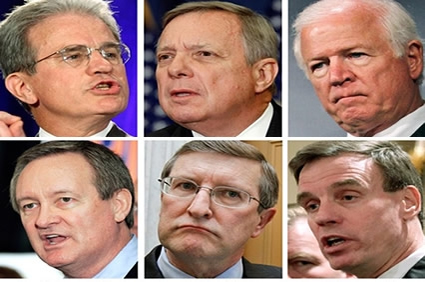 On Tuesday night, the House of Representatives passed the Cut, Cap, and Balance Act (CCBA), which would cap spending at levels set forth in the Ryan budget and allow an increase in the debt ceiling only after the adoption of a constitutional amendment severely restricting future budget and tax measures.
On Tuesday night, the House of Representatives passed the Cut, Cap, and Balance Act (CCBA), which would cap spending at levels set forth in the Ryan budget and allow an increase in the debt ceiling only after the adoption of a constitutional amendment severely restricting future budget and tax measures.
The balanced budget amendment required as a precondition to the debt ceiling increase would be even more extreme than previous incarnations. It would limit spending to about 16.7 percent of gross domestic product and require a two-thirds majority for any increase in revenue, in addition of course to requiring that government spending equal government revenue.
Although the CCBA passed with 234 votes, the tally signaled that the ultimate adoption of a balanced budget amendment in the House is unlikely. A constitutional amendment would require a two-thirds vote to be adopted, and that’s 56 more votes than CCBA received.
A less extreme amendment received 300 votes in 1995.
Fortunately, the CCBA faces “stiff opposition” in the Senate, where it is unlikely to pass at all. (Update: The CCBA was defeated in the Senate a 51-46 vote.)
President Obama has threatened to veto the CCBA if it passes the Senate and labeled the measure an attempt to “duck, dodge, and dismantle.” Nine of the Republican presidential candidates, including current frontrunner Mitt Romney, support the CCBA.
The Center on Budget and Policy Priorities has blasted the balanced budget amendment called for by the CCBA, noting how it would tie the hands of lawmakers to react to changing economic conditions. Five Nobel Laureate economists voiced their opposition to the amendment in a letter to the President and Congress.
The radical spending cap provision would force draconian cuts to essential government programs like Medicare and Social Security, which main stream economists believe would reduce consumer demand and make it far more difficult to create jobs. The amendment would require nearly $9 trillion in cuts over 10 years, which goes well beyond the extreme measures of the infamous Ryan budget.
The proposed amendment would be so damaging that over 240 national organizations have come together to oppose it.
Even the Wall Street Journal editorial page, well known for its extremism and willingness to disregard the facts to support spending and tax cuts, opposes the BBA. The paper notes that not even Ronald Reagan’s policies would have passed muster under the radically stringent amendment.
Former Republican Senator Judd Gregg summed up the debate over the CCBA perfectly, writing, “Lord save us from the well intentioned and those who are trying to score political points or raise money” by pursing this form of “conservative misdirection.”
Photo via Speaker Boehner Creative Commons Attribution License 2.0
 Here’s a
Here’s a  government will start turning soon. Wednesday morning Governor Mark Dayton signed into law legislation that will end the nation’s
government will start turning soon. Wednesday morning Governor Mark Dayton signed into law legislation that will end the nation’s  budget deficit includes revenue measures that would actually increase the deficit — but not as much as revenue measures proposed by President Obama and Republican leaders.
budget deficit includes revenue measures that would actually increase the deficit — but not as much as revenue measures proposed by President Obama and Republican leaders.




 bankroll a California ballot initiative that would make it easier for online shoppers to commit sales tax evasion.
bankroll a California ballot initiative that would make it easier for online shoppers to commit sales tax evasion. of the
of the  On Wednesday, the Center for Media and Democracy (CMD) unveiled “
On Wednesday, the Center for Media and Democracy (CMD) unveiled “ introduced the Stop Tax Haven Abuse Act (S. 1346) to help stem the tide of the estimated $100 billion annual tax revenue loss connected to the use of offshore tax havens. In his
introduced the Stop Tax Haven Abuse Act (S. 1346) to help stem the tide of the estimated $100 billion annual tax revenue loss connected to the use of offshore tax havens. In his